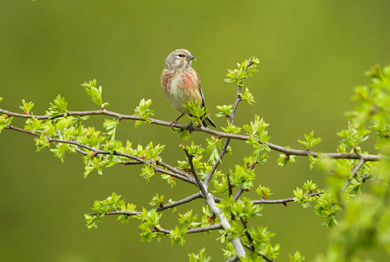Local arable and mixed farmers are being offered free surveys by the RSPB to discover which birds and wildlife have made homes on their farms, and what can be done to help them.
[caption id="attachment_54201" align="alignleft" width="390"] What birds are fluttering on your farm? A Linnet (Carduelis cannabina), in a hawthorn bush. Join the RSPB survey.[/caption]
What birds are fluttering on your farm? A Linnet (Carduelis cannabina), in a hawthorn bush. Join the RSPB survey.[/caption]
The charity has chosen east County Down as a specific focus area for its advisory work as it remains one of the last remaining strongholds for priority seed-eating species such as yellowhammer, skylark and linnet in Northern Ireland. In recent years these birds have experienced widespread declines here, mainly due to a loss of seed-rich habitat.
RSPB NI Conservation Advisor Philip Carson explained: “We are working with farmers in east County Down to help provide priority seed eating birds with the three key things they need to survive – a summer insect source, a winter seed source and suitable nesting habitat.
“If one of these requirements is lost or depleted, birds will find it difficult to survive, especially in winter when food is in short supply. Luckily there are lots of simple things that farmers can do to help birds and other wildlife prosper on their land.”
Since 2013 more than 40 farmers have received surveys by trained volunteers, including local man Roy Lyttle. He commented: “I have lived and worked in the country all my life and was, up until now, unaware of the wide range of wildlife that has been found on our farm.
“We were especially pleased to learn that our farm is home to threatened species such as yellowhammer and linnet and as a result of this survey we will continue to do all we can to protect and help sustain wildlife on our farm.”
The surveys will be delivered between late April and mid-July, and, when complete, farmers will receive a follow up advisory visit to see how they can help the species found on their land.
Volunteer surveyors are also needed to help with this project. Volunteering provides an excellent opportunity to further improve your bird identification skills, increase your knowledge of farmland wildlife ecology and learn more about farming. It is also a great way to get to see some beautiful parts of the countryside you may not have seen before.
With increasing pressures facing farmland wildlife, it is becoming increasingly important for farmers and land owners to do anything they can to help nature give nature a home. Advisory support from the RSPB can help farmers make the most of their land, both for production and wildlife.
]]>
























